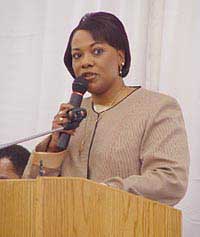-
- Split in Martin Luther King’s family reflects same-sex marriage debate
- Report: Number of gay linguists discharged higher than thought
- Domestic partner amendment used in defense against domestic violence charges
- Renewing AIDS activism
- Supreme Court sidesteps gay adoption case
- Proposed Iowa ordinance protecting gays faces opposition
- National News Briefs
- World News Briefs
national
Split in Martin Luther King’s family reflects same-sex marriage debate
King’s youngest daughter says slain civil rights leader ‘did not take a bullet for same-sex marriage’
Published Thursday, 20-Jan-2005 in issue 891
ATLANTA (AP) – Martin Luther King Jr.’s youngest child lit a torch at her father’s tomb last month to kick off a march advocating a ban on same-sex marriage, creating a strong image linking the slain civil rights icon to today’s heated social debate.
But just nine months earlier, King’s widow defended the rights of same-sex couples in a speech at a New Jersey college.
King never publicly spoke on gay rights while leading the charge toward racial equality in the 1950s and ’60s, but the clash over same-sex marriage has prompted people close to his legacy to pick sides and interpret how they believe King would stand on the issue if he were alive.
Coretta Scott King, a longtime supporter of gay rights, has often invoked her late husband’s teachings while advocating tolerance and equality for the GLBT community. Most recently, she denounced the proposed national constitutional amendment to ban same-sex marriage in a speech at New Jersey’s Richard Stockton College.
“Gay and lesbian people have families and their families should have legal protection, whether by marriage or civil union,” she said in her March 23 address. “A constitutional amendment banning same-sex marriages is a form of gay bashing and it would do nothing at all to protect traditional marriages.”
Martin Luther King III also has condemned homophobia. As an organizer of the 40th anniversary commemoration of the 1963 March on Washington, King and his mother invited GLBT groups to participate.
But the Kings’ youngest child, Bernice King, helped lead thousands of people in an Atlanta march last month that had an anti-gay agenda.
The march, organized by Bishop Eddie Long and his 25,000-member New Birth Missionary Baptist Church, also advocated issues such as education reform and affordable healthcare, but its listed first goal was an amendment to “fully protect marriage between one man and one woman.”
Bernice King, an elder in the church, has repeatedly declined interview requests over the past month.
Alveda C. King – niece of the slain civil rights leader, founder of the faith-based King for America Inc. and a vocal opponent of same-sex marriage – said she joined her cousin in the Atlanta march because she believes her uncle never intended gay rights to be part of the civil rights movement.
“Bernice says herself that she knows deep within that her father did not march and did not take a bullet for same-sex marriage,” said Alveda King.
“I don’t believe that people should be penalized for their affections, but we need to be clear on the purpose of sexuality and marriage, that purpose being procreation,” she said.
Beyond King’s family, many who marched alongside him during the equality movement for blacks have drawn on his message of inclusion.
“Martin Luther King was one of most tolerant and understanding and generous persons I’ve ever known, and I’d never heard him make a judgmental statement about anyone’s sexuality except his own,” said former United Nations ambassador Andrew Young, who was a top aide to King.
U.S. Rep. John Lewis, who helped organize the March on Washington where King gave his famous “I Have a Dream” speech, has been a visible supporter of gay activists, filing a friend-of-the-court brief in the Massachusetts case that led to that state becoming the first in the nation to legalize same-sex marriage.
Discrimination of any kind is not something King would have stood for, said the Rev. Joseph Lowery, who co-founded the Southern Christian Leadership Conference with King. “I don’t recall any experience that would put Dr. King in the category of excluding people,” he said.
Young and other King associates say the whole debate is irrelevant to the issues at the heart of King’s agenda, in which he attacked the “triple evils” of war, poverty and racism.
NAACP board chair Julian Bond said he’s encouraged that King’s legacy continues to inspire people, but he cautioned against drawing any conclusions about a man who’s no longer alive to speak for himself.
“He is a handy weapon for both sides to wield. But that’s not new. We hear all kinds of people quoting him to promote their point of view,” Bond said. “But if you’re saying Martin Luther King wouldn’t do this or would do that without any foundation, that’s just your opinion.”
|
|
Copyright © 2003-2025 Uptown Publications


